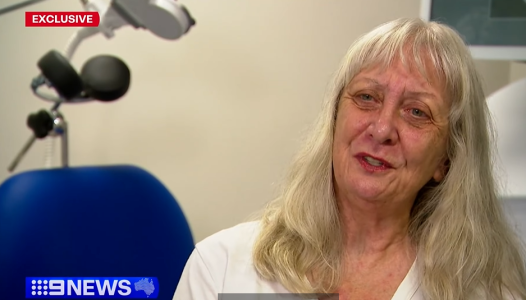Senior makes history by becoming part of world’s first trial for rare, incurable disease
In the face of adversity, some individuals shine as beacons of hope and resilience.
Such is the story of Katrina Jensen, a 68-year-old South Australian grandmother who is courageously confronting her diagnosis of Motor Neuron Disease (MND) by participating in a groundbreaking clinical trial.
This trial, which is among the first of its kind globally, could potentially revolutionise the treatment of this rare and incurable disease, offering a glimmer of hope to thousands affected by similar conditions.
MND, a condition that mercilessly attacks the body's nervous system, leads to progressive difficulties with movement, speech, swallowing, and, ultimately, breathing.
In Australia alone, approximately 2,100 individuals are living with this debilitating disease, each facing the grim reality of a limited lifespan and a gradual loss of autonomy.

According to Healthdirect, there is currently no cure for MND. However, with the assistance of medical specialists, a lot can be done to ease the symptoms of the disease, maintain the patient's quality of life, and ensure they stay mobile for as long as possible.
For Katrina, the diagnosis in December was a life-altering moment, marked by the emotional turmoil of grappling with the finite nature of her existence.
'I cried a lot. You know this is the end of your life coming up,' she shared in an interview.
The hardest part, she revealed, was organising her life to avoid 'ending up in a heap at the bottom of the stairs’.
Yet, amidst the tears and the planning for an uncertain future, Katrina's spirit remains undaunted.
She has chosen to be part of a pioneering clinical trial that aims to mend the 'broken links' between neurons and restore the vital communication channels within the brain.
The treatment, encapsulated in a daily pill, holds the promise of not only halting the progression of symptoms but also potentially repairing the damage inflicted on movement and speech capabilities.
Dr David Schultz, a leading figure in the trial, expressed optimism about the treatment's unique approach.
'This is a unique treatment, which has the potential to restore some of those lost connections that disappear when you have MND,’ he said.
The trial, which involves taking one pill daily for 12 months, represents a beacon of hope for Katrina and the 23 other patients who have bravely signed up.
The trial is currently underway in select hospitals across Adelaide, Brisbane, and Sydney, and its implications extend far beyond MND.
If successful, the drug could also offer therapeutic benefits to patients suffering from other neurological conditions, such as Alzheimer's or Schizophrenia.
Katrina's involvement in the trial is not just a personal quest for a better outcome; it's a contribution to the broader fight against neurological diseases.
'It's really interesting to do... and it could have a good outcome,' she expressed.
The potential of this treatment is not lost on Katrina, who succinctly summed up the collective hope of all involved: 'If it does work, it's going to be flaming brilliant.'
As we celebrate the courage of individuals like Katrina, we also recognise the importance of medical research and the continuous search for cures.

What are your thoughts on this story, members? Share them in the comments below!
Such is the story of Katrina Jensen, a 68-year-old South Australian grandmother who is courageously confronting her diagnosis of Motor Neuron Disease (MND) by participating in a groundbreaking clinical trial.
This trial, which is among the first of its kind globally, could potentially revolutionise the treatment of this rare and incurable disease, offering a glimmer of hope to thousands affected by similar conditions.
MND, a condition that mercilessly attacks the body's nervous system, leads to progressive difficulties with movement, speech, swallowing, and, ultimately, breathing.
In Australia alone, approximately 2,100 individuals are living with this debilitating disease, each facing the grim reality of a limited lifespan and a gradual loss of autonomy.

MND affects the nervous system, leading to difficulties with movement, speech, and other functions. Image source: Unsplash
According to Healthdirect, there is currently no cure for MND. However, with the assistance of medical specialists, a lot can be done to ease the symptoms of the disease, maintain the patient's quality of life, and ensure they stay mobile for as long as possible.
For Katrina, the diagnosis in December was a life-altering moment, marked by the emotional turmoil of grappling with the finite nature of her existence.
'I cried a lot. You know this is the end of your life coming up,' she shared in an interview.
The hardest part, she revealed, was organising her life to avoid 'ending up in a heap at the bottom of the stairs’.
Yet, amidst the tears and the planning for an uncertain future, Katrina's spirit remains undaunted.
She has chosen to be part of a pioneering clinical trial that aims to mend the 'broken links' between neurons and restore the vital communication channels within the brain.
The treatment, encapsulated in a daily pill, holds the promise of not only halting the progression of symptoms but also potentially repairing the damage inflicted on movement and speech capabilities.
Dr David Schultz, a leading figure in the trial, expressed optimism about the treatment's unique approach.
'This is a unique treatment, which has the potential to restore some of those lost connections that disappear when you have MND,’ he said.
The trial, which involves taking one pill daily for 12 months, represents a beacon of hope for Katrina and the 23 other patients who have bravely signed up.
The trial is currently underway in select hospitals across Adelaide, Brisbane, and Sydney, and its implications extend far beyond MND.
If successful, the drug could also offer therapeutic benefits to patients suffering from other neurological conditions, such as Alzheimer's or Schizophrenia.
Katrina's involvement in the trial is not just a personal quest for a better outcome; it's a contribution to the broader fight against neurological diseases.
'It's really interesting to do... and it could have a good outcome,' she expressed.
The potential of this treatment is not lost on Katrina, who succinctly summed up the collective hope of all involved: 'If it does work, it's going to be flaming brilliant.'
As we celebrate the courage of individuals like Katrina, we also recognise the importance of medical research and the continuous search for cures.
Key Takeaways
- A South Australian grandmother with Motor Neuron Disease (MND) is participating in a world-first trial for a new treatment.
- The treatment involves pills that aim to fix broken links between neurons and potentially repair movement and speech damage.
- Katrina Jensen, diagnosed with MND in December, is one of 24 patients involved in the trial.
- If successful, the drug could also benefit patients with other neurological conditions like Alzheimer's or Schizophrenia.








